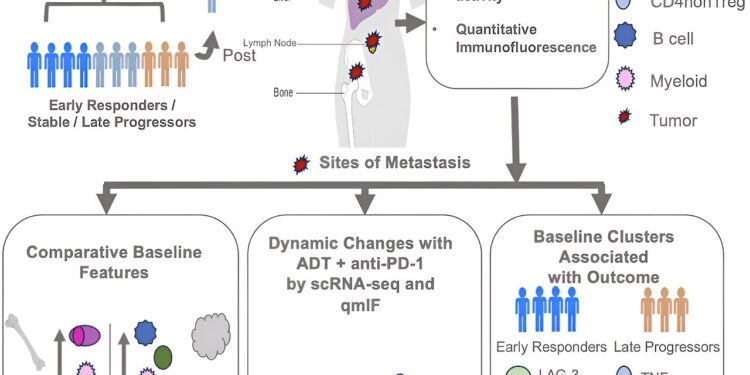Credit: Cancer cell (2023). DOI: 10.1016/j.ccell.2023.10.006
Immunotherapy has proven disappointing as a treatment for prostate cancer, but a new study from Columbia suggests that powerful treatments have potential when the disease begins to spread.
The study, published in Cancer cellfound that metastatic prostate tumors contain a rich variety of immune cells that can potentially be induced by immunotherapy to attack the cancer.
“What we find is that initially, many of the good immune cells are already there, but they’re just not attacking the tumors,” says Aleksandar Obradovic, MD, Ph.D., a research associate at the Vagelos College of Physicians. and surgeons and one of the main authors of the study.
“This is an exciting discovery because prostate cancer has a reputation for being a “cold” tumor, completely hidden from the immune system. Our study suggests that, in the case of metastases, this is not always the case. And that combining hormone therapy with immunotherapy further stimulates anti-tumor immune cells, with potential to further optimize and improve patient outcomes.
Reading the tumor microenvironment
Before the Columbia study, no one had extensively studied the microenvironment of untreated metastatic prostate cancers, discouraged in part by the difficulty in obtaining samples suitable for single-cell RNA sequencing, particularly before the start of the treatment.
In a clinical trial of men with metastatic prostate cancer, Columbia researchers also found that hormone therapy combined with immunotherapy triggered an influx of even more immune cells into the prostate’s microenvironment. tumor. To address this knowledge gap, Columbia researchers designed a clinical trial in a small number of men to obtain such samples before and after treatment with standard chemohormonotherapy and immunotherapy.
“One of the goals of this study was to deeply profile what the microenvironment looks like and then see what happened when tumors were treated with a combination of chemo-hormonal therapy and immune therapies,” says Obradovic.
These analyzes were also made possible thanks to new cutting-edge bioinformatics tools, previously developed by Columbia researchers, capable of revealing numerous cell types in the tumor microenvironment not distinguishable by standard techniques.
Immune cell signatures suggest possible treatments
In addition to discovering a diverse community of immune cells within metastatic tumors, varying from organ to organ, the researchers found that certain subsets of immune cells predicted a worse response to treatment.
Some of the patients’ tumors, for example, were filled with T cells that produce TNF-alpha, which is associated with suppression of the anti-tumor immune response. “We find that patients with large numbers of these cells had worse outcomes,” says Obradovic, “and it is possible that we could potentially improve outcomes in these patients by adding FDA-approved TNF alpha inhibitors to their diet.”
Researchers are planning additional trials to test these ideas and continue to analyze samples from patients ranging from primary to late metastatic prostate cancer to gain a more complete understanding of the changing microenvironment of these tumors.
More information:
Jessica E. Hawley et al, Anti-PD-1 immunotherapy with androgen deprivation therapy induces robust immune infiltration in metastatic castration-sensitive prostate cancer, Cancer cell (2023). DOI: 10.1016/j.ccell.2023.10.006
Provided by Columbia University Irving Medical Center
Quote: For metastatic prostate cancer, immunotherapy may have unexpected potential (December 12, 2023) retrieved December 12, 2023 from
This document is subject to copyright. Apart from fair use for private study or research purposes, no part may be reproduced without written permission. The content is provided for information only.



